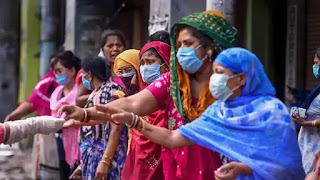But the marginalised sections of the society get affected the most
We have seen the case of migrant worker in India. How they are facing the brunt of corona virus.
Sex Workers :-
According to the National Aids Control Organization (NACO), India has close to 6,37,500 sex workers, and over 5 lakh customers visit the red-light areas on a daily basis, the scientists noted in a release.
Due to COVID-19 they are facing enormous number of problems.
Social Distancing is Impossible :-
There is no Vaccine for Covid-19 as of now.
In cities like Delhi, Mumbai and Kolkata, worst affected areas due to COVID-19, brothels are located in jam-packed red light areas where social distancing is impossible.
Delhi’s GB Road has more than 3,000 sex workers housed in 80 small brothels.
Kolkata’s Sonagachi, which is referred to as Asia’s largest red-light area, has between 8,000–10,000 sex workers.
Hygiene :-
Hygiene is a challenge, with limited access to running water and as many as 20 people sharing one bathroom. Brothels rarely have kitchens and women buy food from vendors. For these women, the lockdown has meant the loss of their entire ecosystem – rickshaw drivers, corner stores, and street carts.
No Business No Money :-
“I ran away from my abusive home in UP at the age of 18. I wanted to be an actress but got into prostitution to survive in this city,” 26-year-old Shalini.
“After getting into this business (sex trade), at least I was not struggling for food, I was not on streets.
But ever since the coronavirus outbreak and the lockdown, I have zero customers and money is drying up,” she said.
No food :-
Sharmila (name changed) who grew up as an orphan on the streets of Kanpur became a sex worker in Delhi five years ago to make ends meet.
“But now there is no food, no medicines and no customers. It is impossible to survive any longer in Delhi with the savings that I have.,” Sharmila, who is planning to move back to Kanpur, said.
No acceptance in society :-
Another sex worker Rajni (name changed) said she and her four-year-old son have not eaten properly in the last two months.
“When my son fainted out of weakness two weeks back I decided to move back.
I have some relatives in UP who do not know what I do here. I will stay with them for some days before figuring out what to do next,” she added.
Unable to reach home :-
After the lockdown, many women left for their villages, but some couldn’t manage to leave.
One woman, who hails from Tamil Nadu, said she wanted to go back to her home. With no buses or trains available, walking remains her only option. “Ek saal lag jayega ghar pahunchne mein agar paidal gaye toh (It would take me a year to reach home if I walked),” she said, adding she wouldn’t take the long walk back.
Though, there is scarce reliable evidence of the risk of infection or complications of COVID-19 among people living with HIV, although the risk could be greater among those who are immunocompromised and not on HIV treatment.
Increased prevalence of underlying health conditions among sex workers might increase risk of COVID-19 progressing to severe illness.
Mental Problems :-
As the uncertainty – and fear of the pandemic – grows, social workers anticipate a sharp spike in depression, anxiety, and perhaps, suicide.
Existing mental health problems are likely to be exacerbated by anxiety over income, food, and housing, alongside concerns about infection from continuing to work in the absence of social protection.
International Situation :-
Same situation prevails in the whole world related to sex workers
Increased policing can expose sex workers to more harassment and violence, and in several countries has already led to home raids, compulsory COVID-19 testing and the arrest and threatened deportation of migrant sex workers.
Sex worker in USA :-
In the US, SWOP-Tucson (the Sex Workers Outreach Project) explained that, “many of these schemes require proof that employment has been lost or reduced as a result of COVID-19. Because sex work is criminalized, it’s not possible to provide necessary paperwork and proof of unemployment or hardship. Thus, sex workers can’t get rent/mortgage relief, utility payment abatements or unemployment checks.”
No opening of Red Light Area in the near future :-
Government of India is unlikely to open brothels and sex work so early because researchers including those from Yale School of Medicine in the US, said closing down these places of sex work may reduce projected COVID-19 death toll increase in India by 63 per cent post the easing of lockdown measures.
Finding of Reports :-
They believe closing of Lockdown can reduce the number of cases by 72 per cent in a period of 45-days, and delay the peak of COVID-19 cases by 17 days.
If the red-light areas are kept closed, they said there can be a delay in the peak of COVID-19 cases by up to 12 days in Mumbai, 17 days in New Delhi, and 29 days in Pune.
According to the scientists, the measure may also reduce COVID-19 cases by a fifth in Mumbai, by 27 per cent in Pune, and 31 per cent in New Delhi.
Study co-author : Jefferey Townsend, (Professor: Biostatistics at the Yale School of Medicine)
Way forward :-
Though it is the need of the hour to not open brothels but there is a critical need for governments and health and social care providers to work with affected communities and front-line service providers to co-produce effective interventions.
It may be the right time for the government to come up with alternative livelihood options for sex workers.
Source – Studyiq

